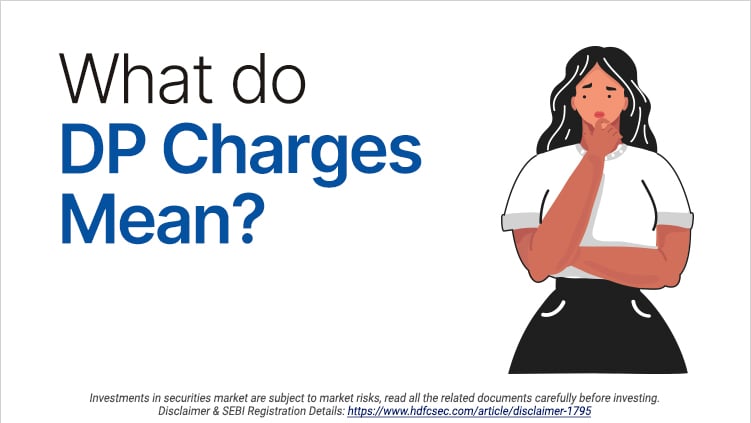What do DP Charges Mean?
As a trader or investor, it is critical to know the various costs and charges associated with trading or investing. Newer market participants are usually aware of brokerage costs but do not pay attention to the other costs that might eat away at their profits. One such important cost that an individual should be aware of is the Depository Participant charges.
What is a Depository Participant?
Before we learn what are DP charges, it is important for us to know what a Depository Participant (DP) is.
A Depository Participant is essentially an intermediary between investors and depositories. A DP can be a brokerage house or a bank. They offer investors a platform to open a demat account where one can store their financial securities in an electronic form or open a trading account to trade in the stock market.
There are two main depositories in India, National Securities Depository Limited (NSDL) and Central Depository Services Limited (CSDL). The depositories store investors’ financial assets like stocks, mutual funds, bonds, etc. in a dematerialized format. Since it is not possible to open an account directly with these depositories, a depository participant is necessary to link the investors with these depositories.
What are DP Charges?
As the name suggests, DP charges are levied by the Depository Participant to the investor or trader. These costs are applicable on all sell transactions. This means, whenever shares are sold from your demat account, you have to pay DP charges.
The DP charges a flat transaction fee applicable on sell transactions. For instance, if the DP charge is Rs 25, you will pay that amount if you sell 10 shares or 100 shares. The total quantity of shares sold does not affect the DP charges.
The DP charges are levied by stockbrokers. These stockbrokers are Depository Participants and they need to pay transaction costs, membership fees, and several other types of costs. These costs are passed on to the customer in the form of DP charges.
DP Charges
The depositories levy the same charges for all sell transactions. The depositories charges for both depositories are.
Charges by NSDL: Rs 13 + Rs 4.50 = Rs 17.50
Charges by CDSL: Rs 13 + Rs 5.50 = Rs 18.50
These costs are applicable on each sell transaction. If multiple sell transactions take place on a single day, DP charges need to be paid for each transaction. However, charges levied by different DPs or depository participants are different.
How to avoid DP charges?
Since any trader or investor would want to take more money home, avoiding additional charges is a matter of concern for many. Here are some tips that can help you save on DP charges.
- DP charges are not applicable on intraday trading as shares are not deposited into your demat account.
- DP charges are not applicable for Futures and Options (F&O). Therefore, a trader can save on this cost by trading in F&O.
- Buying a share and selling it the next day is known as BTST trading. This can help in saving DP charges as the shares are sold before they are credited to the demat account.
Related Posts
Don't miss another Article
Subscribe to our blog for free and get regular updates right into your inbox.
Categories
newsletter
 HSL Mobile App
HSL Mobile App 



